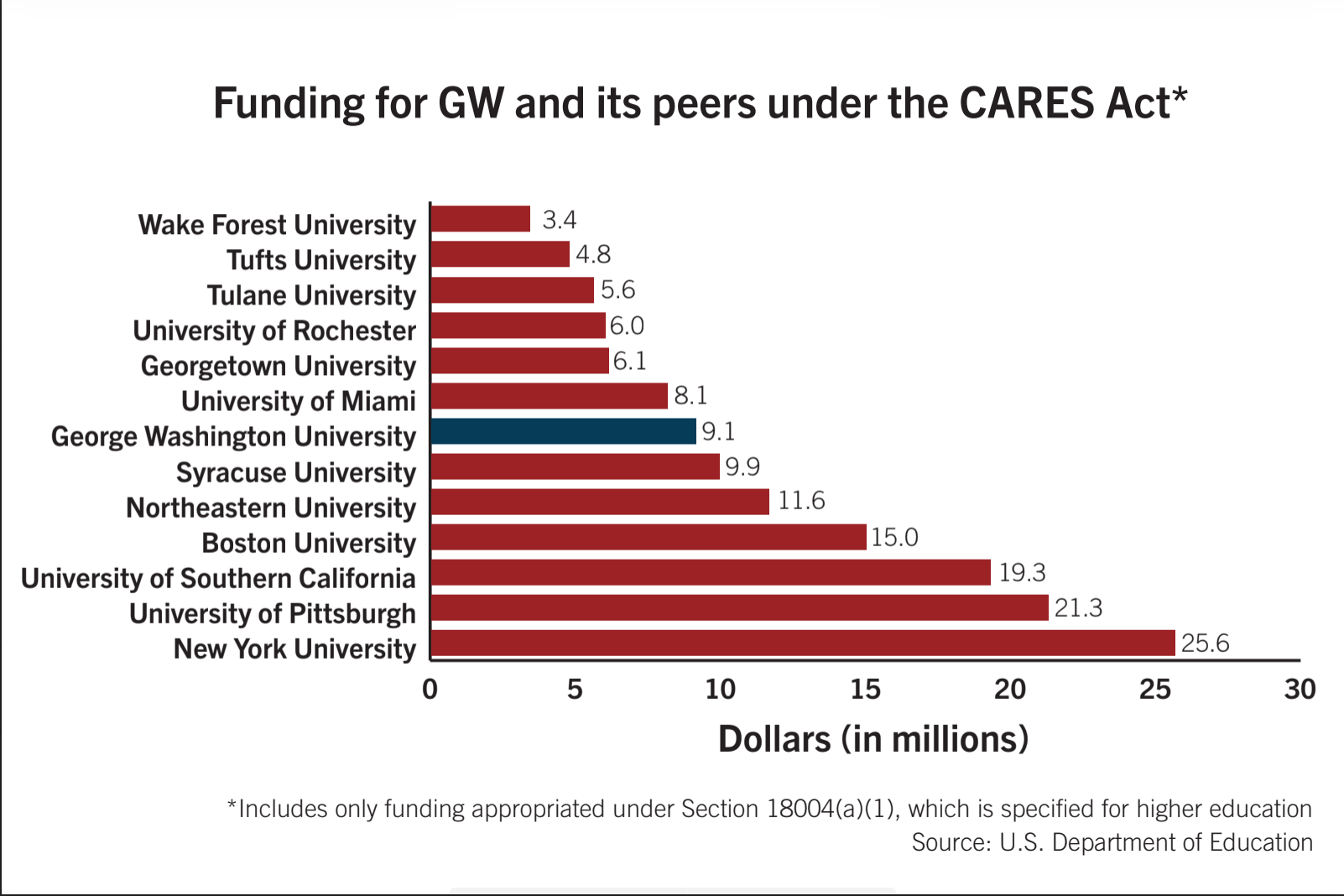GW’s response to the COVID-19 pandemic closely mirrors the decisions made by its peer institutions.
All of the University’s 12 peer schools have moved classes online for at least the rest of the spring semester, and at least 11 have announced they will not hold in-person summer courses for at least part of the term, a decision GW’s provost announced earlier this month. But none of GW’s peers are mandating that moving companies pack and store students’ belongings, and many have yet to announce their plans for students’ items in residence halls.
“The entire leadership of the University is focused almost single-mindedly on COVID-19,” University President Thomas LeBlanc said in an interview earlier this month. “Starting with the health and well-being of our community and the decisions that we’ve made both to move to virtual instruction as well as telework – the decisions we continue to make on an ongoing basis to manage this.”

Alyssa Ilaria | Graphics Editor
Academics
GW administrators announced earlier this month that all classes will remain online through the end of the summer, and residence halls will remain closed.
At least 11 of the University’s peer institutions have joined GW in moving some or all of their summer term to remote learning.
Officials announced March 18 that most undergraduate classes at GW can now be taken on a Pass/No Pass grading scale, in which a grade of D- or above constitutes a pass, and the law school adopted a mandatory Credit/No Credit policy.
All of GW’s peer institutions have announced similar changes to their grading scales for the spring 2020 semester, but some will consider different minimum grades as passing.
Students at the University of Southern California can elect to take classes on a Pass/No Pass basis, but only a grade of C- or above will be considered a pass, according to the USC website.
“For any spring 2020 course, you have the option to change the grade option through May 27,” the website states. “At the conclusion of the semester, faculty members will grade you according to the grade option you selected in web registration for each course.”
Tulane University students can elect to receive one of three grades: “Pass” if they achieve a grade of C- or above, “Minimal Pass” for work between D- and D+ or “Unsatisfactory” if they receive a grade of F, according to their website.
“Undergraduate students may choose the P/MP/U grading option for any course, including core curriculum requirements and courses in the major and minor,” the website states.
Housing and refunds
Officials are offering dining and housing refunds, the latter of which cost the University $18 million, during the instructional continuity period. All of GW’s peer institutions have offered refunds to their students for housing and dining expenses through similar policies.
A petition calling on GW to refund half of tuition has garnered nearly 2,000 signatures, but officials have said they do not plan to refund tuition dollars. None of the University’s peer institutions have offered tuition refunds to students, and at least seven – Boston, New York, Syracuse, Tufts and Tulane universities and the universities of Pittsburgh and Rochester – have explicitly announced they will not do so.
“GW, like colleges and universities all over the country, has heeded the recommendations of public health experts by providing online classes in lieu of in-person classes,” the University website states. “As we continue to deliver quality education, the tuition charged remains the same regardless of format. We look forward to seeing our students successfully complete the semester.”
GW officials announced that two storage companies are packing and storing students’ belongings until the fall for free, and students cannot return to campus to retrieve their items. The move drew criticism from some students, some of whom circulated a petition opposing the decision that gained nearly 1,500 signatures.
Administrators announced classes would remain online for the rest of the semester during spring break, while several of GW’s peer institutions made the announcement when students were still on campus, allowing most of those students to move belongings out of their residence halls.
Some of GW’s peers, like Georgetown University, are providing third-party moving services as an option for students who were not able to collect their belongings, while others have yet to announce details.
“Resident students who are currently off-campus are not able to retrieve their belongings until we receive notice from university officials that we are able to re-open,” the University of Miami website states. “At that time, which may be several weeks away, we will communicate with residents. Due to health and safety measures, we have disposed of perishable items left in student rooms.”
GW will receive $9,118,529 from the multi-trillion federal relief package passed late last month – falling about halfway between its peer institutions – based on the University’s relative share of Pell Grant recipients and non-Pell Grant recipients, according to a U.S. Department of Education release.
Employees
Most GW employees began working remotely March 16, except for designated on-site employees, like some staff in the Division of Safety and Security and Student Health Services.
All of the University’s peer institutions have encouraged most of their employees to work from home through similar policies as 42 states have instituted stay-at-home orders as of Sunday.
“At this time, only individuals who have been deemed essential personnel should be accessing buildings and facilities on our campus,” Syracuse University officials told their employees. “Additionally, access to laboratories is limited to those engaging in essential research activity, including the maintenance of live animals and plants, microbes, cell lines and essential equipment and materials, along with any research related to COVID-19.”
On March 25, GW administrators instituted a freeze on most new hires until further notice to mitigate the negative financial impact of the COVID-19 pandemic, which is projected to cost GW $25 million by June 30. Executive Vice President and Chief Financial Officer Mark Diaz and Provost Brian Blake are reviewing current offers to reaffirm them, and their offices must approve any exceptions to the new policy.
Half of GW’s peers have changed hiring practices in the wake of the virus. At Wake Forest University, the provost or executive vice president must approve any human resources “transaction,” which includes salary increases and new job positions, but there is no official hiring freeze, according to its university’s website.
The universities of Southern California, Rochester and Miami have announced hiring freezes on all non-essential employees, while Tulane and Boston universities implemented partial hiring freezes on non-essential staff positions, excluding faculty.








